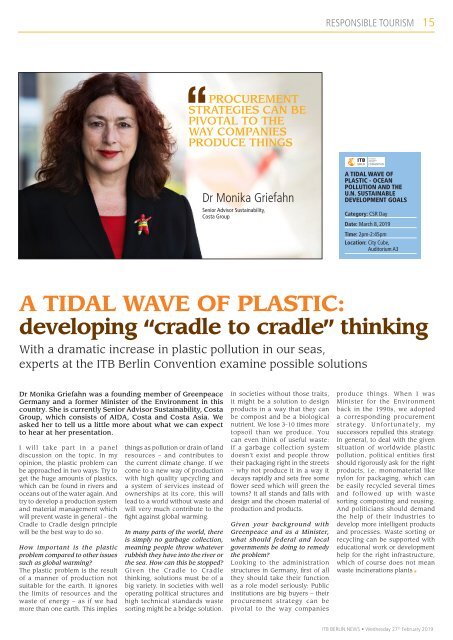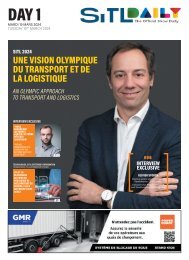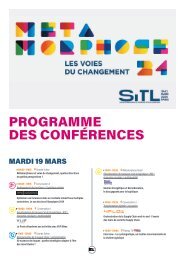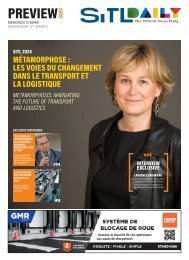ITB Berlin News 2019 - Preview Edition
Create successful ePaper yourself
Turn your PDF publications into a flip-book with our unique Google optimized e-Paper software.
RESPONSIBLE TOURISM<br />
15<br />
PROCUREMENT<br />
STRATEGIES CAN BE<br />
PIVOTAL TO THE<br />
WAY COMPANIES<br />
PRODUCE THINGS<br />
Dr Monika Griefahn<br />
Senior Advisor Sustainability,<br />
Costa Group<br />
A TIDAL WAVE OF<br />
PLASTIC - OCEAN<br />
POLLUTION AND THE<br />
U.N. SUSTAINABLE<br />
DEVELOPMENT GOALS<br />
Category: CSR Day<br />
Date: March 8, <strong>2019</strong><br />
Time: 2pm-2:45pm<br />
Location: City Cube,<br />
Auditorium A3<br />
A TIDAL WAVE OF PLASTIC:<br />
developing “cradle to cradle” thinking<br />
With a dramatic increase in plastic pollution in our seas,<br />
experts at the <strong>ITB</strong> <strong>Berlin</strong> Convention examine possible solutions<br />
Dr Monika Griefahn was a founding member of Greenpeace<br />
Germany and a former Minister of the Environment in this<br />
country. She is currently Senior Advisor Sustainability, Costa<br />
Group, which consists of AIDA, Costa and Costa Asia. We<br />
asked her to tell us a little more about what we can expect<br />
to hear at her presentation.<br />
I will take part in a panel<br />
discussion on the topic. In my<br />
opinion, the plastic problem can<br />
be approached in two ways: Try to<br />
get the huge amounts of plastics,<br />
which can be found in rivers and<br />
oceans out of the water again. And<br />
try to develop a production system<br />
and material management which<br />
will prevent waste in general – the<br />
Cradle to Cradle design principle<br />
will be the best way to do so.<br />
How important is the plastic<br />
problem compared to other issues<br />
such as global warming?<br />
The plastic problem is the result<br />
of a manner of production not<br />
suitable for the earth. It ignores<br />
the limits of resources and the<br />
waste of energy – as if we had<br />
more than one earth. This implies<br />
things as pollution or drain of land<br />
resources – and contributes to<br />
the current climate change. If we<br />
come to a new way of production<br />
with high quality upcycling and<br />
a system of services instead of<br />
ownerships at its core, this will<br />
lead to a world without waste and<br />
will very much contribute to the<br />
fight against global warming.<br />
In many parts of the world, there<br />
is simply no garbage collection,<br />
meaning people throw whatever<br />
rubbish they have into the river or<br />
the sea. How can this be stopped?<br />
Given the Cradle to Cradle<br />
thinking, solutions must be of a<br />
big variety. In societies with well<br />
operating political structures and<br />
high technical standards waste<br />
sorting might be a bridge solution.<br />
In societies without those traits,<br />
it might be a solution to design<br />
products in a way that they can<br />
be compost and be a biological<br />
nutrient. We lose 3-10 times more<br />
topsoil than we produce. You<br />
can even think of useful waste:<br />
If a garbage collection system<br />
doesn’t exist and people throw<br />
their packaging right in the streets<br />
– why not produce it in a way it<br />
decays rapidly and sets free some<br />
flower seed which will green the<br />
towns? It all stands and falls with<br />
design and the chosen material of<br />
production and products.<br />
Given your background with<br />
Greenpeace and as a Minister,<br />
what should federal and local<br />
governments be doing to remedy<br />
the problem?<br />
Looking to the administration<br />
structures in Germany, first of all<br />
they should take their function<br />
as a role model seriously: Public<br />
institutions are big buyers – their<br />
procurement strategy can be<br />
pivotal to the way companies<br />
produce things. When I was<br />
Minister for the Environment<br />
back in the 1990s, we adopted<br />
a corresponding procurement<br />
strategy. Unfortunately, my<br />
successors repulled this strategy.<br />
In general, to deal with the given<br />
situation of worldwide plastic<br />
pollution, political entities first<br />
should rigorously ask for the right<br />
products, i.e. monomaterial like<br />
nylon for packaging, which can<br />
be easily recycled several times<br />
and followed up with waste<br />
sorting composting and reusing.<br />
And politicians should demand<br />
the help of their industries to<br />
develop more intelligent products<br />
and processes. Waste sorting or<br />
recycling can be supported with<br />
educational work or development<br />
help for the right infrastructure,<br />
which of course does not mean<br />
waste incinerations plants<br />
<strong>ITB</strong> BERLIN NEWS • Wednesday 27 th February <strong>2019</strong>

















